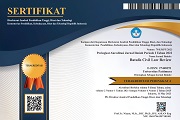Divorce for Sirri Marriage Carried Out by Kairatu West Seram Community
 ), Dyah Auliah Rachma Ruslan(2), Wahdaniah Baharuddin(3), La Ode Amir Amsyahrun(4), Muhammad Haz Reza Ipaenin(5)
), Dyah Auliah Rachma Ruslan(2), Wahdaniah Baharuddin(3), La Ode Amir Amsyahrun(4), Muhammad Haz Reza Ipaenin(5)
(1) Faculty of Law, Universitas Pattimura, Ambon, Indonesia
(2) Faculty of Law, Universitas Pattimura, Ambon, Indonesia
(3) Faculty of Law, Universitas Pattimura, Ambon, Indonesia
(4) Faculty of Law, Universitas Pattimura, Ambon, Indonesia
(5) Faculty of Law, Universitas Pattimura, Ambon, Indonesia
 Corresponding Author
Corresponding Author
Abstract
Introduction: Marriage is said to be valid according to law if it is carried out according to the laws of each religion and belief, otherwise the marriage must be recorded according to applicable laws and regulations.
Purposes of the Research: the specific purposse of this research are: 1. To find out and analyze the basis for allowing the implementation of Sirri Marriage in Kairatu Village community, and 2. To find out and analyze legal implication of Sirri Marriage implementation in Kairatu Village community.
Methods of the Research: This research was conducted using empirical juridical approach which is a study of descriptive qualitative analysis. This research tried to study the Implementation and legal consequences of Sirri marriage in Kairatu Village, West Seram, Maluku Province. How the empirical juridical or sociological juridical method works in this research proposal is; first, the results of collecting and discovering data and information obtained by literature study of the basic assumptions or assumptions are used to answer the problems in this research. Then, inductive-verification testing is carried out on current facts existed within the community. Hence, the truth in a research is declared reliable without having to go through rationalization process.
Results of the Research: Marriage can be said to be legally valid if it is carried out according to the trust of the bride and groom and registered with the marriage registration officer. For those who are Muslim, they are registered with the Office of Religious Affairs, while for those who are non-Muslim, they are registered with the civil registry office.Keywords
DOI
10.47268/ballrev.v5i1.1835
Published
2024-03-31
How To Cite
@article{BALLREV1835,
author = {La Angga and Dyah Ruslan and Wahdaniah Baharuddin and La Ode Amsyahrun and Muhammad Ipaenin},
title = {Divorce for Sirri Marriage Carried Out by Kairatu West Seram Community},
journal = {Batulis Civil Law Review},
volume = {5},
number = {1},
year = {2024},
keywords = {Marriage Law; Siri Marriage; Divorce.},
abstract = {Introduction: Marriage is said to be valid according to law if it is carried out according to the laws of each religion and belief, otherwise the marriage must be recorded according to applicable laws and regulations.Purposes of the Research: the specific purposse of this research are: 1. To find out and analyze the basis for allowing the implementation of Sirri Marriage in Kairatu Village community, and 2. To find out and analyze legal implication of Sirri Marriage implementation in Kairatu Village community.Methods of the Research: This research was conducted using empirical juridical approach which is a study of descriptive qualitative analysis. This research tried to study the Implementation and legal consequences of Sirri marriage in Kairatu Village, West Seram, Maluku Province. How the empirical juridical or sociological juridical method works in this research proposal is; first, the results of collecting and discovering data and information obtained by literature study of the basic assumptions or assumptions are used to answer the problems in this research. Then, inductive-verification testing is carried out on current facts existed within the community. Hence, the truth in a research is declared reliable without having to go through rationalization process.Results of the Research: Marriage can be said to be legally valid if it is carried out according to the trust of the bride and groom and registered with the marriage registration officer. For those who are Muslim, they are registered with the Office of Religious Affairs, while for those who are non-Muslim, they are registered with the civil registry office.},
issn = {2746-8151}, pages = {45--53} doi = {10.47268/ballrev.v5i1.1835},
url = {https://fhukum.unpatti.ac.id/jurnal/ballrev/article/view/1835}
}
Book
Abdullah, Boedi. Marriage and Divorce of Muslim Family. Pustaka Setia: Bandung, 2013.
Adillah, S. U. dan Karmila, M. Legal Analysis of the Factors Behind the Occurrence of Siri Marriages and Their Legal Impact on Husbands, Wives and Children”. Lecturer Research Report. Universitas Islam Sultan Agung. Semarang, 2012.
Bakri, Sidi Nazar. The Key to Household Integrity (Sakinah Family). Knowledge Guide, Jayaz. Jogjakarta, 1993.
Djalil Basiq. The Spread of Islamic Thought in Gayo Land. Qolbun Salim, Jakarta, 2007.
H. Abdul Manan. Principles of Civil Law, Authority of Religious Courts. PT. Raja Grafindo Perkasa. Jakarta, 2001.
Hamid, Zahri. Principles of Islamic Marriage Law and Marriage Laws in Indonesia. Binacipta. Jogjakarta, 1976.
Hasan, Mustofa. Introduction to Family Law. CV. Pusataka Setia. Bandung, 2011. https://doi.org/10.31947/jakpp.v4i1.5902.
M.Yunus. Marriage Law in Islam. Hidakarya Agung. 1st ed. Jakarta: Administrative Law Department, Faculty of Law, Universitas Diponegoro, 1979.
Mardani. Pendekatan Akuntabilitas Pelayanan Publik Dalam Mengikuti Perubahan Paradigma Baru Administrasi Publik. Graha Ilmu Publishing. Jogjakarta, 2011.
Muhammad, Abdul Kadir. Indonesia’s Civil Law. PT.Citra Aditya Bakti: Bandung, 1993.
Prawirohaamidjojo, R. S. Pluralism in Marriage Legislation in Indonesia. Airlangga University Prees. Surabaya, 1988.
Salim HS. Introduction to Written Civil Law. Sinar Grafika. Jakarta, 2008.
Soemiyati. Islamic Marriage Law and Marriage Law. Libertyz. Jogjakarta, 2007.
Sumardjono, Maria S W. Guidelines for Making Research Proposals A Basic Guide. Gramedia Pustaka Utama Publisher. Jakarta, 1996.
Syahar S. Marriage Law and Problems of Its Implementation Viewed from the Perspective of Islamic Law. Alumni. Bandung, 1981.
Tutik, T. T. Civil Law in the National Legal System. Kencana Publishing. Jakarta, 2008.
Thesis, Online/World Wide Web and Others
R.Satria. “Critical Analysis of the Constitutional Court Decision Regarding Material Review.” Badilag.Net, 2022.
Zalyunia, D. Juridical Review of Constitutional Court Decision No. 46/PUU-VII/2010 Regarding Illegitimate Children Connected to the Compilation of Islamic Law and Law No. 1 of 1974 Concerning Marriage”, Thesis. Universitas Indonesia. Depok: Institut Manajemen Koperasi Indonesia, 2012.| Dublin Core | PKP Metadata Items | Metadata for this Document | |
| 1. | Title | Title of document | Divorce for Sirri Marriage Carried Out by Kairatu West Seram Community |
| 2. | Creator | Author's name, affiliation, country | La Ode Angga; Faculty of Law, Universitas Pattimura, Ambon; Indonesia |
| 2. | Creator | Author's name, affiliation, country | Dyah Auliah Rachma Ruslan; Faculty of Law, Universitas Pattimura, Ambon; Indonesia |
| 2. | Creator | Author's name, affiliation, country | Wahdaniah Baharuddin; Faculty of Law, Universitas Pattimura, Ambon; Indonesia |
| 2. | Creator | Author's name, affiliation, country | La Ode Amir Amsyahrun; Faculty of Law, Universitas Pattimura, Ambon; Indonesia |
| 2. | Creator | Author's name, affiliation, country | Muhammad Haz Reza Ipaenin; Faculty of Law, Universitas Pattimura, Ambon; Indonesia |
| 3. | Subject | Discipline(s) | |
| 3. | Subject | Keyword(s) | Marriage Law; Siri Marriage; Divorce. |
| 4. | Description | Abstract | Introduction: Marriage is said to be valid according to law if it is carried out according to the laws of each religion and belief, otherwise the marriage must be recorded according to applicable laws and regulations.Purposes of the Research: the specific purposse of this research are: 1. To find out and analyze the basis for allowing the implementation of Sirri Marriage in Kairatu Village community, and 2. To find out and analyze legal implication of Sirri Marriage implementation in Kairatu Village community.Methods of the Research: This research was conducted using empirical juridical approach which is a study of descriptive qualitative analysis. This research tried to study the Implementation and legal consequences of Sirri marriage in Kairatu Village, West Seram, Maluku Province. How the empirical juridical or sociological juridical method works in this research proposal is; first, the results of collecting and discovering data and information obtained by literature study of the basic assumptions or assumptions are used to answer the problems in this research. Then, inductive-verification testing is carried out on current facts existed within the community. Hence, the truth in a research is declared reliable without having to go through rationalization process.Results of the Research: Marriage can be said to be legally valid if it is carried out according to the trust of the bride and groom and registered with the marriage registration officer. For those who are Muslim, they are registered with the Office of Religious Affairs, while for those who are non-Muslim, they are registered with the civil registry office. |
| 5. | Publisher | Organizing agency, location | Faculty of Law, Universitas Pattimura |
| 6. | Contributor | Sponsor(s) | |
| 7. | Date | (YYYY-MM-DD) | 2024-03-31 |
| 8. | Type | Status & genre | Peer-reviewed Article |
| 8. | Type | Type | |
| 9. | Format | File format | |
| 10. | Identifier | Uniform Resource Identifier | https://fhukum.unpatti.ac.id/jurnal/ballrev/article/view/1835 |
| 10. | Identifier | Digital Object Identifier | 10.47268/ballrev.v5i1.1835 |
| 11. | Source | Title; vol., no. (year) | Batulis Civil Law Review; Vol 5, No 1 (2024): VOLUME 5 ISSUE 1, MARCH 2024 |
| 12. | Language | English=en | en |
| 13. | Relation | Supp. Files | |
| 14. | Coverage | Geo-spatial location, chronological period, research sample (gender, age, etc.) | |
| 15. | Rights | Copyright and permissions | Copyright: Authors who publish their manuscripts in this Journal agree to the following conditions: 1. The copyright in each article belongs to the author, as well as the right to patent. 2. Authors are able to enter into separate, additional contractual arrangements for the non-exclusive distribution of the journal's published version of the work (e.g., post it to an institutional repository or publish it in a book), with an acknowledgment of its initial publication in this journal. 3. Authors are permitted and encouraged to post their work online (e.g., in institutional repositories or on their website) prior to and during the submission process, as it can lead to productive exchanges, as well as earlier and greater citation of published work. 4. Authors have the right to self-archiving of the article (Author Self-Archiving Policy)
Licence : Batulis Civil Law Review Journal is disseminated based on the Creative Commons Attribution-NonCommercial 4.0 International license terms. This license allows anyone to copy and redistribute this material in any form or format, compose, modify, and make derivatives of this material for any purpose. You cannot use this material for commercial purposes. You must specify an appropriate name, include a link to the license, and certify that any changes have been made. You can do this in a way that is appropriate, but does not imply that the licensor supports you or your use.
|
Copyright (c) 2024 La Ode Angga, Dyah Auliah Rachma Ruslan, Wahdaniah Baharuddin, La Ode Amir Amsyahrun, Muhammad Haz Reza Ipaenin.

This work is licensed under a Creative Commons Attribution-NonCommercial 4.0 International License.

 : 1654 times
: 1654 times Download : 743 times
Download : 743 times














